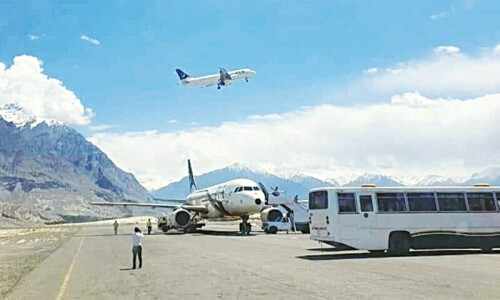ISLAMABAD, Jan 16: As political and business leaders began gathering in Davos for annual meeting of the World Economic Forum next week, the UN Educational, Scientific and Cultural Organisation (Unesco) called upon world leaders on Wednesday to help fill the funding gap to reinvigorate progress towards the goal of ‘Education for All’ aimed at improving learning opportunities for children, youths and adults.
Releasing a policy paper ahead of the Davos summit, Unesco highlighted potential for the private sector to boost considerably its contribution to education sector.
The current private contribution to education in developing countries, totalling $683 million a year, is equivalent to only 5 per cent of all aid to education and less than 0.1 per cent of profits of the world’s two biggest oil companies, according to the policy paper.
The private sector, which benefits from an educated, skilled workforce, should take a much bigger role in funding education worldwide. The paper shows how little education receives compared with other private sector contributions to development; 53 per cent of US foundations’ grants are allocated to health but only 8 per cent to education.
Just five corporations — the Banco Santander, Cisco, Intel, Coca Cola, and Exxon — make up the majority (60 per cent) of the private sector contributions to education. To give an idea of the small scale of those contributions, Coca Cola’s $24m amounts to less than 0.3 per cent of its latest reported annual profits. Exxon, the world’s biggest company, contributes 0.06 per cent.
The paper shows that in 2011 development aid decreased for the first time since 1997; aid to education is now expected to stagnate until 2015 despite a funding gap of $16 billion a year just to send all children to pre-primary and primary school.
Progress towards the ‘Education for All’ goals — which is impossible without funding — has now ground to a halt with less than three years to go until the deadline.
The UN specialised agency recommended that all private organisations should be transparent about the amount and purpose of their commitments.
This would allow scrutiny to ensure that business interests do not override collective goals, while also giving information on the amount of resources available to fill the EFA financing gap.
To have a lasting impact on the EFA, private organisations need to provide sufficient funding over several years to assure the sustainability of initiatives because education is a long-term endeavour. Better evaluations need to be carried out of the impact of private sector interventions.
Private organisations should align their support with government priorities and countries’ needs. The ‘Global Partnership for Education’ could play a larger role in pooling and disbursing funds to this end.
A list of 50 heads of state or government, who will participate in the WTO summit, was released on Wednesday, but it does not mention any representation from Pakistan.















































Dear visitor, the comments section is undergoing an overhaul and will return soon.